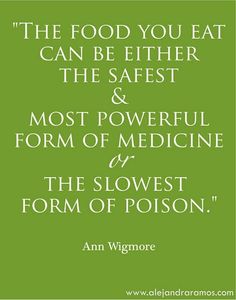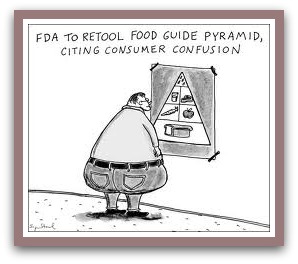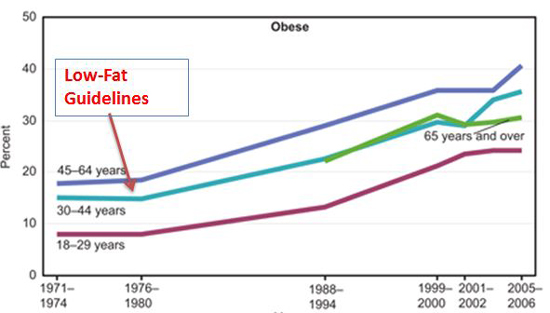 The diet industry flourishes by taking advantage of the public's desire for practical health information, so-called "experts" sell us everything from juicers to supplements, convincing us the whole time we'll live forever thanks to their advice. People selling diets or exercise programs will latch on to true things that help them sell their product; they'll also latch onto false ones.
The diet industry flourishes by taking advantage of the public's desire for practical health information, so-called "experts" sell us everything from juicers to supplements, convincing us the whole time we'll live forever thanks to their advice. People selling diets or exercise programs will latch on to true things that help them sell their product; they'll also latch onto false ones. The diet industry only shares part of the blame here. Much rests squarely on the shoulders of our government. Dietary guidelines issued by government agencies responsible for food (largely the USDA) have changed over the years.

These guidelines have led to the low-fat craze, the salt-is-evil scare, and the eggs-cause-heart-disease panic, all of which have been largely refuted.
The people responsible for dietary guidelines are directly at odds with (and often influenced by) food industry groups, agricultural companies, and other businesses with a massive stake in making sure you eat the food they pack and sell—and they're willing to spend politically to make sure the government recommends their products.
There is also confusion because there really are old beliefs that were held as true that are being corrected. While there is consensus on some things, everyone's body is different.
From studying hundred’s of dietary theories and my review of cutting edge nutritional science I have created my own 10 Rules for Healthy Eating.
Here’s a quick look at the facts:
The obesity epidemic started at almost the exact same time as the low-fat dietary guidelines.

Rule #1 - Ditch the processed food
Chemically processed foods are made solely from refined ingredients and artificial substances.
It’s shocking that the government allows Fruity Pebbles to be labeled as healthy, just because there is a sprinkling of vitamins into the sugary mix.
Here is why processed foods are harming people
· They are designed to be “Hyper Rewarding”, which leads to over-consumption
· The high sugar content makes them highly addictive
· They are low in nutrients and fiber
· It takes less energy to eat and digest
· They are high in unhealthy fats
· They had added high fructose corn syrup
Rule #2 Break up with Sugar
Sugar consumption is strongly associated with some of the world’s leading killers.
· Obesity
· Heart disease
· Type 2 diabetes
· Cancer
· High Blood Pressure & High Cholesterol
· Autoimmune disease
· Alzheimer’s and dementia
· Premature aging of organs, skin, arteries, & joints
· To name a few
Studies have shown sugar to be 8 times as addictive as cocaine.
Sugar is everywhere- it goes by 56 names.
Its hiding places include canned vegetables, cereals, bread, pasta sauce, salad dressings, yogurt and much more
The average American now consumes about 150-170 pounds of sugar per year. That’s about 22 teaspoons per day per person.
Some examples:
Soft Drinks 12 oz 9.75 teaspoons sugar
Blended yogurt 6 oz 8.3 teaspoons sugar
Orange Juice 10 oz 7.5 teaspoons sugar
Whole wheat bread- 2 slices 11.2 teaspoons sugar
Here are the latest recommendations:
· Women - 20 g = 5 teaspoons
· Men - 36 g = 9 teaspoons
· Children - 12 g = 3 teaspoons
(4 grams of sugar = 1 teaspoon sugar)
Rule #3 –Drink Enough Water
Water isn't just "good for you". Water burns fat, prevents fatigue, suppresses hunger, renews your skin, rids toxins and relieves constipation.
Even mild dehydration can impair brain function: mood, memory, concentration, and frequency of headaches.
How much water should we get?
1/2 of your weight in oz. of water PER DAY!!!!
Rule #4 Eat your veggies-more matters
How SAD is the Standard American Diet? The USDA guidelines are 5 servings of fruits and vegetable per day.
· 3 of 4 Americans don’t eat a single piece of fruit in a given day.
· 9 of10 Americans don’t eat the minimum recommended daily servings of vegetables.
Cutting edge nutritional science demonstrates the role of plant based diets play in helping to prevent, treat and reverse the 15 leading causes of death.
Eat 8-10 Or More Servings of
Vegetables PER DAY!!!
Or 2 lbs PER DAY!!!
Vegetables Servings
· 1 cup raw
· 1/2 cup cooked
Rule #5 Eat organic, clean food
Why eat organic?
· Eating organically grown foods is the only way to avoid the cocktail of chemical poisons present in commercially grown food.
· Organically grown foods have more nutrients, vitamins, minerals, enzymes, and micronutrients than commercially grown foods because the soil is managed and nourished with sustainable practices by responsible standards.
· Organically grown food cannot be genetically modified in any way.
The Environmental Working Group puts out the Clean 15 (OK to eat non-organic) and Dirty dozen (Foods to eat organic). Here’s the link:
https://www.ewg.org/foodnews/
Rule #6- Avoid Synthetic Fats/ Eat Natural Fats
These Synthetic fats are referred to as Vegetable oils, but they aren’t really vegetables: soybean, sunflower, corn, canola, cottonseed, safflower and others.
The processing method involves pressing, heating, various industrial chemicals and highly toxic solvents.
Synthetic fats contain excess Omega-6 fatty acids, which cause inflammation when out of balance. Inflammation is the root cause of cardiovascular disease, arthritis, depression, dementia and cancer.
Healthy natural fats contain Omega-3 fatty acids. The benefits of omega-3s include reducing the risk of heart disease and stroke while helping to reduce symptoms of hypertension, depression, attention deficit hyperactivity disorder, joint pain and other rheumatoid problems, as well as certain skin ailments. Some research has even shown that omega-3s can boost the immune system and help protect us from an array of illnesses including Alzheimer's disease.
Eating a diet with good quality fat and protein prevents and even reverses diabetes and pre-diabetes.
Healthy Fats;
· Avocados
· Olives, extra virgin olive oil
· Fatty fish
· Coconut, coconut oil
· Pastured eggs
· Nuts and seeds
Rule 7-You are what you eat ate
· Avoid hormones, antibiotics and drugs in animal products.
· Animals thrive when they exist on the diet that they are naturally meant to eat.
· Choose free-range/pastured animal products whenever possible.
· Look for wild-caught fish where possible, the farmed varieties are fed an unnatural diet of soy, corn and grain pellets.
Rule #8-Gluten Free Isn’t a Free pass
Packaged, processed gluten-free is very high in sugar and GMO’s. Gluten free pancakes have more sugar than white baguette!
Rule #9 Make a Menu
· Map your meals for the week
· Shop with a list
· Home cook meals whenever possible
· Use in-season produce
· Repurpose leftovers
· Prepare batches of foods to combine into multiple meals
· Bring Your own food to events
· Ask questions when eating out
· The more you cook and have the good stuff around, the less depend you will be on junk
Rule #10 Eat mindfully and thankfully
· Eat only when you’re hungry.
· Stop eating when you are full.
· Make time to focus solely on eating.
· Set the mood.
· Slow it down.
· Take a break.
· Finish last.
· Appreciate what’s on your plate.
Eating mindfully can have a drastic effect on satiation levels.
Eat well, be well, live well
Make the rest of your life the BEST of your life
